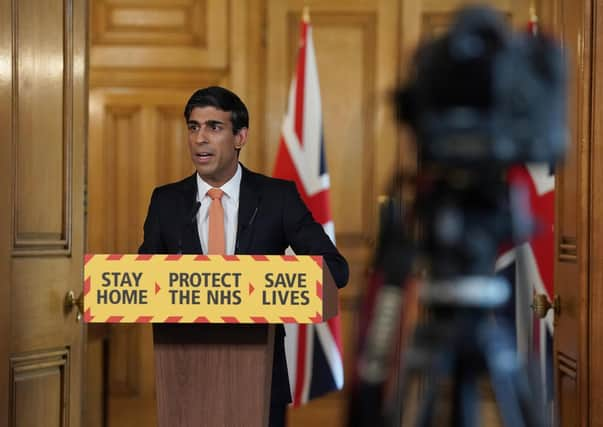Listen to North not just London doomsayers on crisis recovery plan - David Blunkett


I’ve asked myself: ‘What would you do if you were in a position of authority?’ That is why, with the exception of testing and availability of personal protective equipment (PPE), I have been generally supportive of the Government’s approach to Covid-19.
Last month I reflected on the Budget which had taken place the previous Wednesday, and the stand-off between the Home Secretary and senior members of her staff. All this now seems like ancient history.
Advertisement
Hide AdAdvertisement
Hide AdSince then we have probably had the equivalent of three more Budgets, in which the Chancellor of the Exchequer and MP for Richmond, Rishi Sunak, has acquitted himself impressively.


The problems for the Home Secretary, Priti Patel, like her profile, have faded into the distance. In the meantime, we have all been asked to self-isolate and unofficially – the Government don’t like to use this term – been put in semi ‘lockdown’.
Over these weeks, we have seen the most enormous commitment in every part of our lives. From the NHS and social care, through to those continuing to drive buses and trains, the shop assistants putting themselves at considerable risk and local government workers re-adapting, despite their capacity to do so having been drastically diminished over the last 10 years. It is nothing short of a miracle that things are still operating.
Of course, what some of us refer to as ‘civil society’ has always stepped up when things have been at their worst and it is true across the world. People are prepared to go the extra mile.
Advertisement
Hide AdAdvertisement
Hide AdPray God that it continues in the months and years ahead, although, to be frank, I’m more worried about the lasting legacy of isolation. It is fine for people to be ‘online’, chatting, Facetiming and all the rest of it, but actually what we are re-enforcing – and in danger of becoming accustomed to – is social distancing rather than social empathy and coming together.
The new ways of remote working will undoubtedly continue when this is over and – with it – less coming together at work.
There will, of course, be upsides in terms of productivity, creativity and innovative ways of facing what was already a major challenge of technological change. Artificial intelligence, robotics, the ever-increasing use of algorithms taking over decision-making, and the readjustment of the skills needed for the years ahead. All of these were already in train and will be accelerated by what has happened.
But there will also be some fundamental questions about the role of Government, the nature of how politics adapts to the new circumstances and, of course, how on earth our economy can recover.
Advertisement
Hide AdAdvertisement
Hide AdThe Conservative Government has had to abandon ideological dogma, adopting and expanding the kind of measures once condemned by them, for example, in the aftermath of the international banking crisis 11 years ago.
The other major political change that has taken place is Labour’s election of Sir Keir Starmer who, with his credible frontbench team, will need to adjust to the new reality.
The hundreds of billions of pounds that has now been devoted to keeping the economy afloat, to keeping businesses in being, and men and women in employment, self-evidently squeezes out alternatives. That will be the reality of our democratic dialogue in the years to come.
How do we ensure that those who so often have been the victims of deindustrialisation, of major global technological change and of austerity, do not end up once again being the losers? That is why, here in Yorkshire, we need to adopt and adjust as quickly as we can.
Advertisement
Hide AdAdvertisement
Hide AdIt will be time for city and city regions, institutions and businesses across the North to collaborate wherever possible. For universities to join up rather than compete for the much-diminished national resources that will be available for the development, not just of science and technology and engineering, but of new ways of delivering services and helping people to adjust to the world of tomorrow.
Talk of ‘capping’ the number of students able to go to university, at a time when young people will have substantially diminished options for employment and alternative routes for skilling, is, frankly, ridiculous. Now, above all, we need not only those university places to be available, but to link with Further Education so that high-level apprenticeships can also be forged out of the post-pandemic era.
Finally, my own thoughts. The sooner we can exit this crisis mode, the better. The sooner we see a recovery plan which moves from helping businesses to simply survive and workers furloughed into a re-emergence of something like normality, the better for all of us. Better in terms of our health and wellbeing, as well as our income and sense of purpose.
This is why the Government must take the widest possible advice available, not just one or two centres of particular scientific expertise in a wide range of academic, business and political voices. We, here in the North, have centres of excellence and inherent wisdom as well as scholastic talent.
Advertisement
Hide AdAdvertisement
Hide AdThose voices must now be heard and not be drowned out by London-centric, London-focused, media-savvy and – let me say it – ‘doom merchants’ on our television and radio.
As soon as we can, and when the NHS is in a position to test, to reduce the danger of large-scale fatalities, we must provide hope for the future.
In the meantime, at this Eastertide with its message of restoration and hope, I wish the Prime Minister well and an early return to Downing Street and may all of you go well in the weeks ahead.
David Blunkett is a Labour peer and former Home Secretary.
Editor’s note: first and foremost - and rarely have I written down these words with more sincerity - I hope this finds you well.
Advertisement
Hide AdAdvertisement
Hide AdAlmost certainly you are here because you value the quality and the integrity of the journalism produced by The Yorkshire Post’s journalists - almost all of which live alongside you in Yorkshire, spending the wages they earn with Yorkshire businesses - who last year took this title to the industry watchdog’s Most Trusted Newspaper in Britain accolade.
And that is why I must make an urgent request of you: as advertising revenue declines, your support becomes evermore crucial to the maintenance of the journalistic standards expected of The Yorkshire Post. If you can, safely, please buy a paper or take up a subscription. We want to continue to make you proud of Yorkshire’s National Newspaper but we are going to need your help.
Postal subscription copies can be ordered by calling 0330 4030066 or by emailing [email protected]. Vouchers, to be exchanged at retail sales outlets - our newsagents need you, too - can be subscribed to by contacting subscriptions on 0330 1235950 or by visiting www.localsubsplus.co.uk where you should select The Yorkshire Post from the list of titles available.
If you want to help right now, download our tablet app from the App / Play Stores. Every contribution you make helps to provide this county with the best regional journalism in the country.
Sincerely. Thank you.
James Mitchinson
Editor
